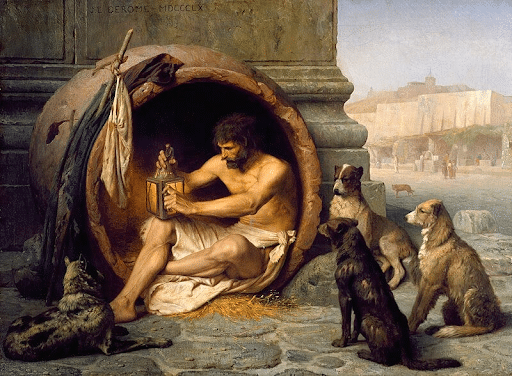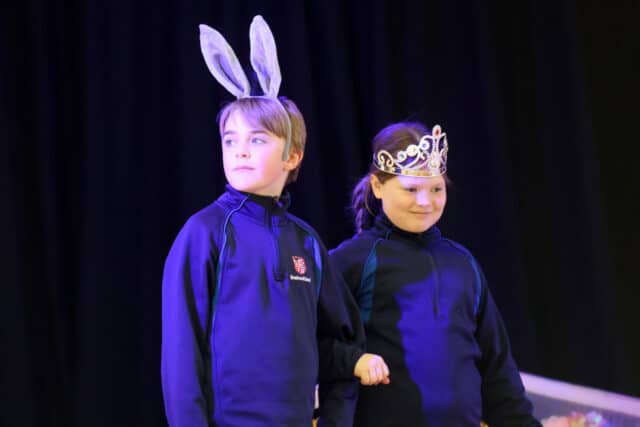The Moneyless Man
Dear all,
As well as being April Fools’ Day, it’s also been our Theology and Philosophy Enrichment Week and in our final assembly of the term we combined the two through the story of Diogenes, a philosopher who lived 2,000 years ago.
Diogenes was one of history’s most unusual philosophers. Born around 412 BC in Sinope, in modern-day Turkey, he is remembered as a man who challenged the norms of society, lived in extreme simplicity, and had a sharp wit that earned him both admiration and ridicule. He is also regarded as one of the founders of Cynicism – not the same as the modern meaning of the word but rather based on the Greek word ‘kynikos’, meaning dog-like – which was based on their belief that humans should live in harmony with nature, rather than being distracted by materialism or the cultural norms and conventions of the day.
He believed that happiness came from living a virtuous and simple life, unburdened by the pursuit of possessions, power, or status, and to demonstrate this during his time in Athens he lived in a large barrel with few possessions.
Diogenes also had a famously combative relationship with Plato, one of the most prominent philosophers of the time. Plato was known for his deep and abstract philosophical discussions, particularly his theory of forms, which argued that everything in the physical world is a shadow of its ideal, perfect form.
Diogenes, however, had no patience for abstract ideas that didn’t relate to everyday life. The two often clashed, with Diogenes mocking Plato’s refined lifestyle and lofty discussions. While Plato valued intellectual exercises, Diogenes believed that philosophy should be practical and grounded in action, not words. Despite their differences, their rivalry helped shape ancient philosophical debates about the nature of virtue, truth, and the purpose of philosophy itself.
Diogenes was known for upsetting conventions and challenging the norm – he wandered the streets with a lantern, claiming to be searching for an honest man, in an attempt to highlight what he saw as the hypocrisy and dishonesty of society.
Most famously, he is said to have met Alexander the Great, one of the most powerful men in history. Curious about Diogenes’ reputation, Alexander visited him and asked if there was anything he could do for him. Diogenes, lying in the sun at the time, replied, ‘Yes, stand a little out of my sunlight. It is reported that rather than being indignant, Alexander was impressed by this boldness and irreverence.
Diogenes’ ideas influenced later philosophers, particularly Zeno of Citium, who founded Stoicism. You may remember from assemblies at the beginning of the school year, that Stoics advocated self-control, resilience, and living in harmony with nature. While Stoicism is less extreme than Cynicism, it is built on the foundation that Diogenes laid: the idea that inner contentment matters more than external wealth or recognition.
Most of us would baulk at the idea of living in the way advocated by Diogenes, but there are examples of those who have chosen to do so. One of the most well-known is a man called Mark Boyle, who wanted to see if he could live without money. He set up an organisation called the Freeconomy Community in 2007, and between 2008-11 he lived largely without using money. He wrote a book about the experience called The Moneyless Man and a few years later he moved back to his home country of Ireland, where he set up a moneyless pub called the ‘Happy Pig’. He followed this up by building a house made of straw bales and then announced that he would live without using any form of modern technology, such as mobile phones, computers, or TV. His lifestyle even excludes the use of electricity and running water. He read his last emails on 20th December 2016, and in a recent interview, he claims he is happier than he was before he chose his alternative lifestyle.’
There are, of course, less dramatic ways of testing life without so much focus on material possessions. Buy Nothing Day began in the 1990s as a protest against the consumerism of Black Friday and as well as the Freeconomic Community, organisations such as the Freeskill and Freecycling Hub exist to promote sharing of resources to promote environmentalism and community coherence.
In a world seemingly dominated by material possessions and non-stop exposure to advertising and marketing that tries to convince us we need the latest clothes or technology in our lives, perhaps we could learn something from Diogenes and those who were influenced by his beliefs.
Have a great Easter break.
Best wishes
Michael Bond




